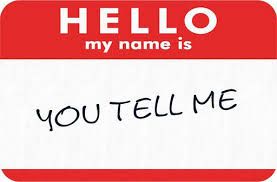Forgiveness
The Thoroughly Modern Guide to Butchering Names
Tips, hints and tricks for navigating challenging new name situations.
Posted January 2, 2014

If you’ve ever had what some might consider an atypical name, well then I’m certain you could be authoring this post right now. In fact, your name may not be that unique at all. Perhaps your parents spelled your name differently like Ashleigh or Mykel and this led to mass confusion. But anyone who has had that awkward pause before their first or last name knows exactly what I’m talking about.
My name has been the source of family debate essentially as soon as I was old enough to go to school and encounter the dreaded roll call. I quickly learned to state my name when the teacher was ending the “r” section alphabetically. I dreaded the discomfort of a well-intentioned teacher trying to phonetically sound out my name more than the resulting butchered name that only somewhat resembled my own. As such, the family started considering a name alteration.
For the record my name is Goal Auzeen, Goali for short. Not Goali Auzeen, not Goal with Auzeen as the middle name. It is just a two-part first name like Mary-Kate Olsen without a hyphen. You are starting to see though that this explanation is a mouthful. Especially when meeting someone for the first time. Or in scenarios when people are going around the room and quickly stating their names. There is no space for a monologue discussing the etymology of your name at that time.
Hence there is the family debate. "Why don’t you just go by Goal?" my mom would ask. "I named you, and I’m ok with that." Goal as the first name and Auzeen as the middle name just like everyone thinks it is. Or, we can add that hyphen. Maybe, we can make it into one word Goalauzeen and then just Goali for short, they’d ponder. But changing the name given to me at birth to satisfy others never seemed right to me either.
And then there are the soccer jokes. The few individuals who do share my name spell in Goli which further exacerbates my athletic goalkeeper similarity. I will be honest, sometimes when one asks if I play soccer I’m tempted to tell them I’m an Olympic athlete that did in fact play for the U.S. Women’s Soccer team. But usually when they ask if I ever get “the soccer joke” I typically reply with, “no, actually you’re the first person ever to come up with that.” Snide, I know and I’m sorry. Mostly.
However, I’m well aware that as far as name luck is concerned, I don’t actually have it that bad. I learned early on in kindergarten from a Vietnamese friend named Becky that it could be worse. Her legal name was Bich. Which is how she came to be Becky. Then there was the guy who said that in his native tongue his name was very similar to the word for cow. Yes, it definitely could have been much worse for me.
And yet, when I first meet patients in the lobby and walk them back to my office I often make a last minute decision of how to introduce myself. Option A: go with Goali and hope they don’t ask bizarre questions that I have to attempt to answer down our long walk in the hallway past the open office doors of colleagues. Option B: just go with “Hi, I’m Dr. Saedi” since my pronunciation of it sounds like the girl’s name Sadie. The drawback of option B is sounding like an arrogant young professional who calls herself “doctor” when virtually no one else in the clinic refers to themselves that way. What to do?
Well, the truth is, the introduction of my name has not always been a disaster. You see, for the briefest period of time when an intern at UC Berkeley, I was one of 5 unique names in a cohort of 9. Mine was not the only name that caused pause for the first time in my life. And furthermore, people didn’t bat an eye. It wasn’t treated as strange, otherworldly, or funny. It was simply my name.
I came to realize this was in effect a wonderful result of diversity. When you live in a culturally rich environment, there is greater acceptance and appreciation of the beauty we all bring to the table. What further struck me was how well those uncertain name situations were handled. I saw there really was an art to asking for name clarification and pronunciation that was not offensive to the person with the tricky name. So on behalf of all of us who really are just as uncomfortable as you are in such situations, here is a list of ways to more sensitively approach name pronunciation uncertainty:
1) Ask what the name was again. Don’t be embarrassed that you didn’t catch it the first time. I’d much rather someone ask me than think I said Goldie and ask me about Goldielocks.
2) Apologize and ask again if you have to. I’ve had numerous situations with international students where I genuinely did not catch the name the first, or second time. Granted, this does not make it ok to ask the person to repeat it 6 times. However, a genuine apology and indication that you truly care about correctly pronouncing the name can go far.
3) Ask for the spelling. One trick I’ve learned from non-native English speakers is how helpful spelling something out can be. It’s possible that in their native tongue they are pronouncing a soft “r” sound or omitting sounds altogether. But getting a sense of the composition of the name can help.
4) Ask what family or friends call them. Do not give individuals a nickname on your own behalf. Truth be told, this is how my dad ended up as a “Ted.” That’s right. Goal Auzeen’s dad is named Ted. How did that happen? Long story short, a well-intentioned co-worker wanted to make it easier for my dad in work introductions and so forth. The name stuck. While I went through a period of time being convinced that I genuinely looked like a Jennifer, the truth is my name is not Jennifer and it never will be. However, sometimes individuals may have easy to pronounce nicknames given to them by friends or family. Naturally, you’d have to ensure they were comfortable with you adopting the name.
5) Watch your follow-up language. When uncomfortable, individuals may try to make up for it by saying something. Anything. We’ve all done it and then felt like we put our foot in our mouth. Follow-ups to my name I’ve personally heard. “What an unusual name,” “you mean like in soccer,” “what a unique name,” (emphasis on unique with a funny facial expression) “were you parents big soccer fans growing up?” However, I’ve also heard much nicer follow-ups such as “I’ve never heard that name before, it’s so pretty,” “do you mind if I ask the ethnic origin of that name?” “that sounds beautiful, I’d love to give my kids a name with more heritage in it some day.” It’s all about how you say it. Asking for the ethnic origin for example is much more subtle than “where do you come from” which yes, people still ask in this day and age.
6) It’s ok to ask for the story. Have you ever done that ice-breaker? The one where they ask how you got your name? Well, one of the advantages to having an original name can be the fun story behind it. I usually talk about my name’s botanical origins. I explain that a lot like Lavender being a name and color, Goali is the same. Except it also means floral and refers to reddish-pink hues. My full name has an even more interesting story behind it. But you wouldn’t know it if you took it at surface value. So go ahead and ask. Usually there is an interesting story and it can help you get a better sense of the person. Even if it’s just a tricky last name. You might learn it’s of Dutch origin and about your new friend’s family ancestry.
7) There are sometimes shortcuts. You might be thinking at this point, yes, but there are some names I simply can’t pronounce! I would agree with you. I have worked with students from countries who have names with sounds I’ve never been able to pronounce. I’ve had students with names made up of many syllables and panicked wondering how I was going to call out their name in the waiting room. Often I would give it my best shot, apologize immediately and ask for the proper pronunciation. Sometimes if the last name was easier, I’d address them as Mr. or Ms. I’ve known some therapists to ask if it’s ok to call clients by an initial such as J or G. So just because there is no nickname or easier way to pronounce it, you can still have a sensitive conversation expressing your desire to acknowledge the person appropriately.
8) We give hints. At the end of the day, one consequence of a possessing a challenging name is that we develop a pretty good sixth sense about when someone is uncomfortable, uncertain, or even forgot our name altogether. Although not everyone does this, I usually make sure when initially introducing myself to use my name in the third person several times casually in conversation so that they have the opportunity to become familiarized with its pronunciation. Though it can seem strange to address yourself in the third person, it can actually work a lot more naturally than you’d think. For example, “so my friend the other day was like Goali, I saw you posted a blog article, but I didn’t have time to read it. And I said it was no big deal and that I was used to it.”
In this day and age of increasing diversity and multiculturally rich environments we are constantly adapting and learning to embrace new traditions and ways of life. Although celebrities have been playing with names for some time (e.g., Apple, Blue Ivy, North West), the era of us learning to sensitively approach names is long overdue. So from the girl who cannot play soccer ever again due to certain developed sensitivities, please help stop the butchering and ridicule of innocent names.
Follow me on Twitter at MillenialMedia where there will be no World Cup tweets, ever.




